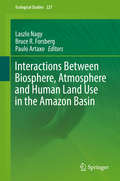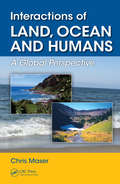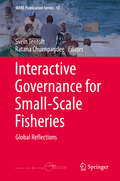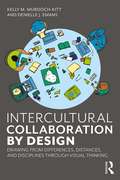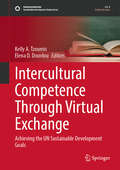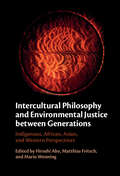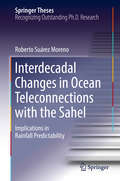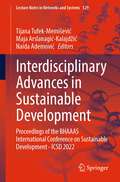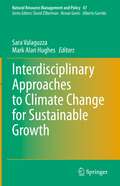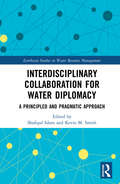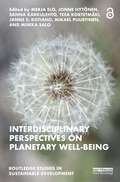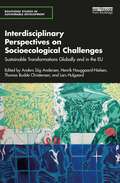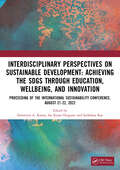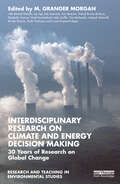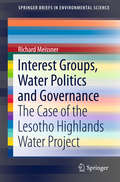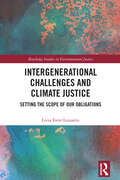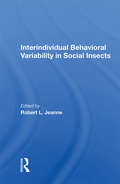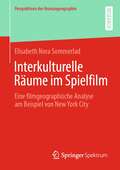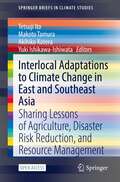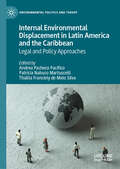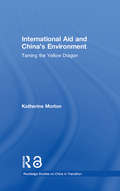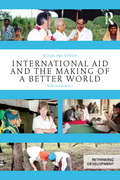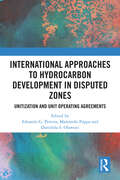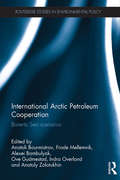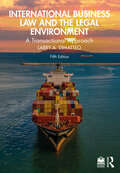- Table View
- List View
Interactions Between Biosphere, Atmosphere and Human Land Use in the Amazon Basin
by Laszlo Nagy Bruce R. Forsberg Paulo ArtaxoThis book offers apanorama of recent scientific achievements produced through the framework of theLarge-Scale Biosphere-Atmosphere programme (LBA) and other research programmesin the Brazilian Amazon. The content is highly interdisciplinary, with an overarchingaim to contribute to the understanding of the dynamic biophysical andsocietal/socio-economic structure and functioning of Amazonia as a regionalentity and its regional and global climatic teleconnections. The targetreadership includes advanced undergraduate and post-graduate students andresearchers seeking to untangle the gamut of interactions that the Amazon's complexbiophysical and social system represent.
Interactions of Land, Ocean and Humans: A Global Perspective
by Chris MaserWritten by Chris Maser, one of the architects of the sustainability movement, Interactions of Land, Ocean and Humans: A Global Perspective explores a critical number of the myriad aspects that comprise the great, reciprocal feedback loops between the mountain peaks, the deep sea, and everywhere in between. Maser's exploration of these connections g
Interactive Governance for Small-Scale Fisheries
by Svein Jentoft Ratana ChuenpagdeeDrawing on more than 30 case studies from around the world, this book offers a multitude of examples for improving the governance of small-scale fisheries. Contributors from some 36 countries argue that reform, transformation and innovation are vital to achieving sustainable small-scale fisheries - especially for mitigating the threats and vulnerabilities of global change. For this to happen, governing systems must be context-specific and the governability of small-scale fisheries properly assessed. The volume corresponds well with the Voluntary Guidelines for Securing Sustainable Small-Scale Fisheries adopted in 2014, spearheaded by the United Nations Food and Agriculture Organization (FAO). These affirm the importance of small-scale fisheries for food security, nutrition, livelihoods, rural development and poverty reduction. The book arises from the project Too Big To Ignore: Global Partnership for Small-Scale Fisheries Research (TBTI). "A nuanced, diverse, vibrant and local-specific collection of essays - just as the small-scale fisheries around the world - dealt with by this versatile array of authors. Following on the heels of the recently adopted FAO Small-Scale Fisheries Guidelines, here is an erudite compendium which I heartily recommend to policy makers, academics and activists who wish to come to terms with the complex issue of governance of this important field of human activity. " John Kurien - Founding Member of the International Collective in Support of Fishworkers (ICSF), and Former Professor, Centre for Development Studies, Trivandrum, India "Likely to become a classic in its field, this book is about small-scale fisheries and interactive governance - governance which is negotiated, deliberated upon, and communicated among stakeholders who often share governing responsibilities. The authors show that interactive governance is not just a normative theory but a phenomenon that can be studied empirically, here with 34 case studies from as many countries around the world, north and south, east and west. Such "force of example" enables the editors to put together well-developed arguments and sometimes surprising conclusions about the way ahead. A must-read for managers, practitioners, stakeholders, and students!" Fikret Berkes - University of Manitoba, Canada, and author of Coasts for People
Intercultural Collaboration by Design: Drawing from Differences, Distances, and Disciplines Through Visual Thinking
by Kelly M. Murdoch-Kitt Denielle J. EmansIntercultural Collaboration by Design introduces a framework for collaborating across cultures and learning to use multicultural perspectives to address pressing global issues. This handbook helps people work, learn, and teach across cultures. Through the activities highlighted in this book, virtual and intercultural teams will find a practical route for initiating and sustaining productive work across disciplinary and social barriers. Teams can craft a plan to achieve their goals by selecting the activities that best meet their needs and interests. First-person anecdotes from the authors demonstrate how the activities encourage teams to embrace diverse perspectives in order to create innovative solutions. With over 30 hands-on activities, this book will be of great interest to diverse teams from a variety of disciplines who want to enhance intercultural learning and co-working. Whether in the classroom or workplace, the activities are appropriate for a variety of collaboration contexts, without a need for background in art or design.
Intercultural Competence Through Virtual Exchange: Achieving the UN Sustainable Development Goals (Sustainable Development Goals Series)
by Kelly A. Tzoumis Elena D. DouvlouThis book addresses the importance of sustainability and environmental worldviews and the role of intercultural competencies in achieving SDGs acceptance and their effective implementation. Particularly since the pandemic, there is a growth in online education, and this offers opportunities for educators and students that can be exploited with a focus on sustainability. The book provides examples of virtual exchange including Global South and Global North with tools ranging from Project-Based and Community-Based Service Learning, Debates, Environmental Games and Simulations, Virtual Reality/Augmented Reality, and Accessibility and DEI issues. Additionally, issues of social justice and digital colonialism are a thread through several of the chapters. By providing a broad range of global learning experiences from scholars across several continents from various disciplines that include various post-secondary education based on tools and best practices, the book is a great resource to academics, researchers, and students on approaches to education that prepare the learner for praxis and effective implementation of sustainable solutions for their professional and social future perspectives. Chapter "How can we raise global citizens at home: Evidence from an intercultural virtual collaboration between the Netherlands and Japan" is available open access under a via link.springer.com.>
Intercultural Philosophy and Environmental Justice between Generations: Indigenous, African, Asian, and Western Perspectives
by Matthias Fritsch Mario Wenning Hiroshi AbeThis anthology combines an intercultural approach with intergenerational ethics to address critical environmental challenges. Written by scholars from all over the world, including Canada, the US, New Zealand, Nigeria, Ethiopia, Japan, the UK, China, and Spain, this book offers new perspectives on how to foster sustainable societal practises that draw on the past and are fair to future generations. It introduces the Māori idea that views all things and human generations in layered relations; Indigenous accounts of spiralling time and reciprocities among ancestors and descendants; the philosophical dimensions of Chinese conceptions of ancestor spirits and future ghosts; and African accounts of anamnestic solidarity among generations. These ideas influence proposals for how to confront ending worlds and address the environmental future of humanity, making this book a valuable resource for scholars and students of environmental law and policy, environmental humanities, political science, and intercultural and comparative philosophy, as well as policymakers.
Interdecadal Changes in Ocean Teleconnections with the Sahel: Implications in Rainfall Predictability (Springer Theses)
by Roberto Suárez MorenoIn tropical latitudes, monsoons trigger regimes of strong seasonal rainfall over the continents. Over the West African region, the rainfall has shown a strong variability from interannual to decadal time scales. The atmospheric response to global sea surface temperatures is the leading cause of rainfall variability in the West African Sahel. This thesis explores changes in the leading ocean forcing of Sahelian rainfall interannual variability. It anaylzes the dynamical mechanisms at work to explain the non-stationary sea surface temperature-forced response of anomalous rainfall. The underlying multidecadal sea surface temperature background is raised as a key factor that favors some interannual teleconnections and inhibits others. Results of this thesis are relevant for improving the seasonal predictability of summer rainfall in the Sahel.
Interdisciplinary Advances in Sustainable Development: Proceedings of the BHAAAS International Conference on Sustainable Development -ICSD 2022 (Lecture Notes in Networks and Systems #529)
by Naida Ademović Tijana Tufek-Memišević Maja Arslanagić-KalajdžićThis book presents interdisciplinary research and scientific outcomes in sustainable development acquired from the BHAAAS International Conference on Sustainable Development-ICSD2022 as part of the 13th Days of Bosnian-Herzegovinian American Academy of Arts and Sciences held in Sarajevo, June 23-26, 2022. The main event enabled researchers and experts from 25 countries to exchange their knowledge, ideas and experiences. The general scope of the book includes topics presented at three specialized symposia: The Quadruple Helix Approach, Sustainable Urban Development and Sustainable Civil Engineering with research topics ranging from SDGs, sustainable development education, environmental and social responsibility and consumption to sustainable retrofit strategies, urban heritage conservation, urban mobility, Space Syntax analysis, watercourse recovery, railway corridors and more. The book is recommended for fellow researchers, professionals, and students in the fields of economy, politics, architecture, urban planning, civil engineering and related fields.
Interdisciplinary Approaches to Climate Change for Sustainable Growth (Natural Resource Management and Policy #47)
by Sara Valaguzza Mark Alan HughesThe book is an edited collection of contributions by a distinguished international panel of academics on the main scientific, juridical, and economic aspects involved in the mitigation and adaptation processes imposed by climate change. Explicitly interdisciplinary, the book transversally cuts through different disciplines offering an outline of a phenomenon that is too often left to specific and sectorial insights. The volume is divided into four parts. The first part introduces the main concepts of the book: climate change and sustainability, wellbeing, and mitigation and adaptation. The second part presents the scientific understanding of climate change and explores some of the more pressing issues driving policy development, such as the melting of the glaciers and the impact on coastal areas. The third part discusses significant experiences in the environmental policies both in the European Union and in the United States of America. The last section explains possible approaches to climate change, by exploring the legal and economic aspects of both adversarial and more lenient approaches towards a more sustainable world. It faces four main issues in the economic and juridical context: consumer behaviors, climate litigations, environmental litigations and the alternative forms of dispute resolution on environmental matters, with particular regard to environmental mediation. Offering a new vision of sustainable policies, this volume will be of interest to researchers and students of environmental policy, resource economics, environmental law, sustainable development, and public administration, as well as practitioners and policy makers working in related areas.
Interdisciplinary Collaboration for Water Diplomacy: A Principled and Pragmatic Approach (Earthscan Studies in Water Resource Management)
by Shafiqul Islam Kevin M. SmithThis book introduces the concept of Water Diplomacy as a principled and pragmatic approach to problem-driven interdisciplinary collaboration, which has been developed as a response to pressing contemporary water challenges arising from the coupling of natural and human systems. The findings of the book are the result of a decade-long interdisciplinary experiment in conceiving, developing, and implementing an interdisciplinary graduate program on Water Diplomacy at Tufts University, USA. This has led to the development of the Water Diplomacy Framework, a shared framework for understanding, diagnosing, and communicating about complex water issues across disciplinary boundaries. This framework clarifies important distinctions between water systems - simple, complicated, or complex - and the attributes that these distinctions imply for how these problems can be addressed. In this book, the focus is on complex water issues and how they require a problem-driven rather than a theory-driven approach to interdisciplinary collaboration. Moreover, it is argued that conception of interdisciplinarity needs to go beyond collaboration among experts, because complex water problems demand inclusive stakeholder engagement, such as in fact-value deliberation, joint fact finding, collective decision making, and adaptive management. Water professionals working in such environments need to operate with both principles and pragmatism in order to achieve actionable, sustainable, and equitable outcomes. This book explores these ideas in more detail and demonstrates their efficacy through a diverse range of case studies. Reflections on the program are also included, from conceptualization through implementation and evaluation. This book offers critical lessons and case studies for researchers and practitioners working on complex water issues as well as important lessons for those looking to initiate, implement, or evaluate interdisciplinary programs to address other complex problems in any setting.
Interdisciplinary Perspectives on Planetary Well-Being (Routledge Studies in Sustainable Development)
by Sanna Karkulehto Merja Elo Jonne Hytönen Teea Kortetmäki Janne S. Kotiaho Mikael Puurtinen Miikka SaloThis book proposes a paradigm shift in how human and nonhuman well-being are perceived and approached. In response to years of accelerated decline in the health of ecosystems and their inhabitants, this edited collection presents planetary well-being as a new cross-disciplinary concept to foster global transformation towards a more equal and inclusive framing of well-being. Throughout this edited volume, researchers across the humanities, social sciences, and natural sciences apply and reflect on the concept of planetary well-being, showcasing its value as an interdisciplinary, cross-sectoral changemaker. The book explores the significance of planetary well-being as a theoretical and empirical concept in sustainability science and applies it to discipline-specific cases, including business, education, psychology, culture, and development. Interdisciplinary perspectives on topical global questions and processes underpin each chapter, from soil processes and ecosystem health to global inequalities and cultural transformation, in the framework of planetary well-being. The book will appeal to academics, researchers, and students in a broad range of disciplines including sustainability science, sustainable development, natural resources, and environmental humanities. Calling readers to assess, challenge, and rethink the dominant perceptions of well-being and societal activities, this rich resource that explores the interconnection between human and nonhuman well-being serves as a tool to foster transformative action towards a more sustainable society.
Interdisciplinary Perspectives on Socioecological Challenges: Sustainable Transformations Globally and in the EU (Routledge Studies in Sustainable Development)
by Anders Siig Andersen Henrik Hauggaard-Nielsen Thomas Budde Christensen Lars HulgaardThis book explores interdisciplinary perspectives on socioecological challenges and offers innovative solutions at both a European and global level. This book critically reflects on the latest scientific knowledge regarding the increasing instability of the Earth System caused by human activities during the Anthropocene and the Great Acceleration. It focuses on the global and European challenges regarding climate, resources, bio-integrity, and environment. The authors assess the obstacles to overcoming these challenges and examine the risks posed by path dependencies, lock-ins, and trade-offs between global and regional goals. They also drill down into the complexities of the European Green Deal, specifically the similarities and differences between the scientific analyses and recommendations from the European Environment Agency and the content of the Deal. Finally, the book looks at the Just Transition put forward by the European Green Deal. The authors discuss this in a context of global and European ecological and socioecological challenges and put the question of equality, recognition, and democratization at the center. Outlining new pathways to broaden the scope of scientific collaboration between the natural and technical sciences and the social sciences and the humanities, this volume will be of great interest to students and scholars of sustainable development, environmental policy and governance, and environmental justice.
Interdisciplinary Perspectives on Sustainable Development: Achieving the SDGs through Education, Wellbeing, and Innovation
by Sai Kiran Oruganti Sudeshna Ray Dimitrios A. KarrasISC 2022 is dedicated to the Niti Aayog policies to promote sustainability through exchange of ideas emerging out of the academia. The ISC is an annual conference that is held in virtual mode until COVID restrictions on travel exist. The vision of the conference is to capacitate Academia with the necessary ideas that provide insights of the grassroot level development to various stakeholders of the Niti-Aayog policies. Towards this goal, the conference creates a conjunction of various stakeholders of Niti-Aayog policies that include- academic institutions, government bodies, policy makers and industry. The ISC organizers make concerted efforts to promote academic research that would technological, scientific, management & business practices, and insights into policy merits & disruptions. The framework of exchange of ideas is geared towards adoption of deep technologies, fundamental sciences & engineering, energy research, energy policies, advances in medicine & related case studies. This framework enables the round table discussions between the academia, industry and policy makers through its range of plenary and keynote speakers.
Interdisciplinary Research on Climate and Energy Decision Making: 30 Years of Research on Global Change (Research and Teaching in Environmental Studies)
by Jay Apt Tim McDaniels Hadi Dowlatabadi Ann Bostrom Granger M. Morgan Ahmed Abdulla Inês Azevedo Bruin, Wändi Bruine de Elizabeth Casman Mike Griffin Joshuah Stolaroff Brinda Thomas Parth VaishnavThis book explores the role and importance of interdisciplinary research in addressing key issues in climate and energy decision making. For over 30 years, an interdisciplinary team of faculty and students anchored at Carnegie Mellon University, joined by investigators and students from a number of other collaborating institutions across North America, Europe, and Australia, have worked together to better understand the global changes that are being caused by both human activities and natural causes. This book tells the story of their successful interdisciplinary work. With each chapter written in the first person, the authors have three key objectives: (1) to document and provide an accessible account of how they have framed and addressed a range of the key problems that are posed by the human dimensions of global change; (2) to illustrate how investigators and graduate students have worked together productively across different disciplines and locations on common problems; and (3) to encourage funders and scholars across the world to undertake similar large- scale interdisciplinary research activities to meet the world’s largest challenges. Exploring topics such as energy efficiency, public health, and climate adaptation, and with a final chapter dedicated to lessons learned, this innovative volume will be of great interest to students and scholars of climate change, energy transitions and environmental studies more broadly.
Interest Groups, Water Politics and Governance
by Richard MeissnerThe book investigates the role interest groups have played over the years to influence the governments of Lesotho and South Africa, the World Bank and project implementation authorities in changing some policy aspects of the Lesotho Highlands Water Project (LHWP). Some of the issues being agitated by the interest groups are the resettlement of villagers where some of the dams for the projects are being constructed. The author argues that interest groups and individuals have the ability to influence the above-mentioned institutions and to such an extent that water politics and governance is not the domain of state institutions only.
Intergenerational Challenges and Climate Justice: Setting the Scope of Our Obligations (Routledge Studies in Environmental Justice)
by Livia Ester LuzzattoClimate change poses questions of intergenerational justice, but some of its features make it difficult to determine whether we have obligations of climate justice to future generations. This book offers a novel argument, justifying the present generation’s obligations to future people. Livia Luzzatto shows that we have intergenerational obligations because many of our actions are based on presuppositions about future people. When agents engage in such intergenerational actions, they acquire an obligation to also recognize those future people as agents within their principles of justice, and with that a duty to respect their agency and autonomy. Intergenerational Challenges and Climate Justice also offers a way to circumvent the problems of non-identity and non-existence. Its approach overcomes the intergenerational challenges of climate change by meeting three necessary criteria: providing ways to cope with uncertainty, dealing with the complexity of climate change, and including future people for their own sake. The author meets these criteria by adopting an action-centered methodology that grounds our obligations of justice on the presuppositions of activity. This robust framework can be used to justify increased climate action and the greater inclusion of future-oriented policies in current decision making. This book will be of great interest to academics and students concerned with the issues of climate and intergenerational justice.
Interindividual Behavioral Variability In Social Insects
by Robert L. JeanneThis book represents empirical studies of some aspect of the phenomenon of variability in social insect behavior. It illustrates the range of ways colony members can differ from one another and interprets the variability in terms of the external environment, social context, or individual experience.
Interkulturelle Räume im Spielfilm: Eine filmgeographische Analyse am Beispiel von New York City (Perspektiven der Humangeographie)
by Elisabeth Nora SommerladSpielfilme imaginieren New York City oft als eine Stadt, in der das alltägliche Zusammenleben durch interkulturelle Begegnungen konstituiert wird. Das vorliegende Buch nimmt sich diesem Topos an. Die filmgeographische Studie analysiert, wie Spielfilme interkulturelle Begegnungen inszenieren. Die Autorin erarbeitet anhand von 17 US-amerikanischen Spielfilmen, wie interkulturelle Begegnungen strategisch inszeniert werden. Hierbei hinterfragt sie kritisch die Darstellungen gesellschaftlicher Herausforderungen, welche sich im Kontext des dargebotenen Miteinanders ergeben. Das Ergebnis sind sechs vielschichtige Dimensionen interkultureller Räume. Diese offenbaren, dass NYC letztlich vor allem als Stadt kultureller Koexistenz inszeniert wird – als Projektionsfolie einer Gesellschaft, in der sich Individuen anhand diffuser kultureller Marker beständig voneinander abgrenzen. Die Studie liefert damit einen Beitrag zum mediensensiblen Diskurs über interkulturelle Fragestellungen, denen in globalisierten, kulturell diversen und medienaffinen Gesellschaften höchste Relevanz zukommt.
Interlocal Adaptations to Climate Change in East and Southeast Asia: Sharing Lessons of Agriculture, Disaster Risk Reduction, and Resource Management (SpringerBriefs in Climate Studies)
by Tetsuji Ito Makoto Tamura Akihiko Kotera Yuki Ishikawa-IshiwataThis Open Access book’s main focus is agriculture and natural resource management, disaster risk reduction, and human resource development in the countries of East and Southeast Asia and Japan.Asia is one of the regions which is the most vulnerable to the impacts of climate change. More than sixty percent of the world’s people live in the region, making it the growth center of the world. Asia is vast and includes various countries and regions, this book is focused on East and Southeast Asia including Japan. It is essential to share the knowledge and experiences for adapting climate change among these areas.In order to tackle these issues, the book aims to:Promote inter-local lessons learnt sharing climate change adaptations; "agriculture and natural resource management" and "disaster risk reduction and human resource development"Provides insights into new adaptation measures and research approaches that can consider the regional nature of Southeast AsiaShare practical adaptation options permeated by society in each country/regionThis book will be of interest to researchers and students examining climate change impacts in East and Southeast Asia.
Internal Environmental Displacement in Latin America and the Caribbean: Legal and Policy Approaches (Environmental Politics and Theory)
by Andrea Pacheco Pacifico Patrícia Nabuco Martuscelli Thalita Franciely de Melo SilvaThis book offers a comprehensive exploration of the pressing issue of environmentally displaced persons (EDPs) in Latin America and the Caribbean, filling a gap in the existing literature. The concept of EDPs only gained prominence on the international stage in the late 20th century, but despite significant attention in recent years, there has been a conspicuous absence of a consolidated resource on the topic, particularly within this region. This book's editors, distinguished Brazilian scholars with extensive experience in academia and as consultants, have crafted a meticulously researched and thought-provoking volume. It addresses the historical evolution of EDP visibility among different stakeholders and delves into the legal and policy dimensions crucial for the protection of these vulnerable individuals. Drawing from an array of case studies, including Mexico, Haiti, Colombia, and Brazil, the book elucidates the multifaceted challenges faced by EDPs. It examines specific populations (women and girls, children, and indigenous communities) disproportionately affected by environmental displacement. This comprehensive work not only serves an academic purpose but also provides valuable insights and guidance to governments, NGOs, international agencies, and other actors grappling with the dilemma of protecting EDPs in the region. It stands as a unique and indispensable resource, offering a consolidated repository of information, data, and references that is unparalleled in the field. Readers will benefit from the wealth of knowledge and expertise encapsulated within this book, making it an essential addition to discuss the issue.
International Aid and China's Environment: Taming the Yellow Dragon (Routledge Studies on China in Transition #Vol. 25)
by Katherine MortonRapid economic growth in the world's most populous nation is leading to widespread soil erosion, desertification, deforestation and the depletion of vital natural resources. The scale and severity of environmental problems in China now threaten the economic and social foundations of its modernization. Using case studies, Morton analyzes the relationship between international and local responses to environmental problems in China, challenging the prevailing wisdom that weak compliance is the only constraint upon local environmental management in China. It advances two interrelated discussions: first, it constructs a conceptual framework for understanding the key dimensions of environmental capacity. This is broadly defined to encompass the financial, institutional, technological and social aspects of environmental management. Second, the book presents the results of an empirical inquiry into the implementation of donor-funded environmental projects in both China's poorer and relatively developed regions. By drawing upon extensive fieldwork, it seeks to explain how, and under what conditions, international donors can strengthen China's environmental capacity, especially at the local level. It will be of interest to those studying Chinese politics, environmental studies and international relations.
International Aid and the Making of a Better World: Reflexive Practice (Rethinking Development)
by Rosalind EybenHow can international aid professionals manage to deal with the daily dilemmas of working for the wellbeing of people in countries other than their own? A scholar-activist and lifelong development practitioner seeks to answer that question in a book that provides a vivid and accessible insight into the world of aid – its people, ideas and values against the backdrop of a broader historical analysis of the contested ideals and politics of aid operations from the 1960s to the present day. Moving between aid-recipient countries, head office and global policy spaces, Rosalind Eyben critically examines her own behaviour to explore what happens when trying to improve people’s lives in far-away countries and warns how self-deception may construct obstacles to the very change desired, considering the challenge to traditional aid practices posed by new donors like Brazil who speak of history and relationships. The book proposes that to help make this a better world, individuals and organisations working in international development must respond self-critically to the dilemmas of power and knowledge that shape aid’s messy relations. Written in an accessible way with vignettes, stories and dialogue, this critical history of aid provides practical tools and methodology for students in development studies, anthropology and international studies and for development practitioners to adopt the habit of reflexivity when helping to make a better world.
International Approaches to Hydrocarbon Development in Disputed Zones: Unitization and Unit Operating Agreements
by Damilola S. Olawuyi Eduardo G. Pereira Marianthi PappaThis book analyses the legal obstacles associated with the advancement of unitization processes and procedures at an international level.Using case studies in international (cross-border) unitization and joint development agreements, the book uses regional examples from the Americas, Europe, Africa and the Middle East. It also touches upon case studies related to ongoing disputes from the South China Sea, Mediterranean Sea and Gulf of Guinea. Focusing on best practices which have influenced the development of the unitization concept, the book looks at the formulation of different models and agreements, and their potential impact on unexplored hydrocarbon resources, particularly in cases where unitization is necessary.The book will be of interest to practitioners, scholars and students in the field of natural resource law, international law and unitization.
International Arctic Petroleum Cooperation: Barents Sea Scenarios (Routledge Studies in Environmental Policy)
by Indra Overland Anatoli Bourmistrov Frode Mellemvik Alexei Bambulyak Ove Gudmestad Anatoly ZolotukhinThe Arctic region contains large amounts of natural resources considered necessary to sustain global economic growth, so it is unsurprising that it is increasingly susceptible to political, economic, environmental, and even military conflicts. This book looks in detail at the preconditions and outlook for international cooperation on the development of Arctic petroleum resources, focusing on Norwegian–Russian cooperation in the Barents Sea towards 2025. The authors provide a cross-disciplinary approach including geopolitical, institutional, technological, corporate and environmental perspectives to analyse the underlying factors that shape the future development of the region. Three future scenarios are developed, exploring various levels of cooperation and development influenced by and resulting from potential political, commercial and environmental circumstances. Through these scenarios, the book improves understanding of the challenges and opportunities for Arctic petroleum resource development and promotes further consideration of the possible outcomes of future cooperation. The book should be of interest to students, scholars and policy-makers working in the areas of Arctic studies, oil and gas studies, energy security, global environmental governance, environmental politics and environmental technology.
International Business Law and the Legal Environment: A Transactional Approach
by Larry A. DiMatteoThe fifth edition of International Business Law and the Legal Environment: A Transactional Approach gives business and law students a clear understanding of the legal principles that govern international business. This book goes beyond compliance by emphasizing how to use the law to create value and competitive advantage.DiMatteo’s transactional approach walks students through key business transactions—from import and export, contracts, and finance to countertrade, dispute resolution, licensing, and more—giving them both context and providing real-world applications. This new edition also features:● Added coverage of new technologies, such as smart contracts, digital platforms, and blockchain technology, artificial intelligence, market for non-fungible tokens, and the metaverse● Discussion of businesses and sustainability, climate change, and creating a circular economy● International perspective and use of a variety of national and international law materials● Greater coverage of EU substantive law including the new Artificial Intelligence Act.Upper-level undergraduate and postgraduate students of business law and international business will appreciate DiMatteo’s lucid writing style, and professionals will find this book to be a comprehensive resource. Online resources include an instructor’s manual, PowerPoint slides, and test bank.
